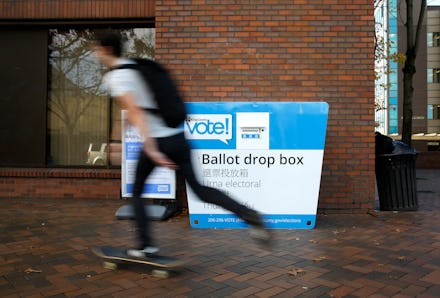New study projects stunning drop in 2018 millennial voter turnout in battleground states

The 2016 presidential election — and its outcome — may have given plenty of Americans a new sense of urgency when it comes to civics.
But a new study projects that 40 million Americans who voted last year will likely not show up at the polls for the 2018 midterms — and that two-thirds of those “drop-off” voters will be millennials, unmarried women and people of color.
The report, just out from the Voter Participation Center and Lake Research Partners, “Comparing the Voting Electorate in 2012-2016 and Predicting 2018 Drop-off,” notes that many of those expected not to cast a ballot next year live in key battleground states like Arizona, Nevada, Florida and Ohio.
“Everybody declines in their turnout in off-year elections. But the decline is much, much more dramatic among the ‘Rising American Electorate,’” Democratic strategist and pollster Celinda Lake said in a Thursday conference call about the findings.
According to the report produced for the nonprofit Voter Participation Center, which works to increase civic engagement, “35.1% of those who voted in 2016, or 25.4 million RAE voters, will stay home” in 2018. By comparison, “The predicted drop-off among non-RAE voters is only 22.1%, or 14.4 million voters.”
The study defines the “Rising American Electorate” as unmarried women, millennials ages 18 to 34, African-Americans, Latinos and other people of color as defined by the U.S. Census.
Together, Lake said, the “RAE” numbers about 133 million people. At 59.2% of the voting-eligible U.S. population in 2016, the 2016 presidential race marked the first election in which this group stood in the majority.
However, “The RAE, while increasing their turnout and increasing in their numbers, still lags behind the non-RAE in its overall turnout,” Lake noted.
The researchers said there are an array of reasons why members of the RAE don’t vote at the same rates as their older, white or married counterparts.
Among them: RAE voters may have less information about the candidates or the voting process itself. They may feel less engaged in state or local elections than national ones. Particularly in the case of millennials, they tend to move more often, requiring them to re-register to vote each time they do.
Finally, the study’s creators said, campaign-season messaging may not be targeted at the concerns of RAE voters because of their age or family status.
All this can contribute to a sense of discouragement about traditional civic engagement, and members of the RAE cohort may opt for alternatives, such as volunteerism or expressing their views via social media.
Of course, this new electorate has plenty of overlap within the groups it comprises; unmarried women and millennials are the biggest part of the equation.
Within the RAE, “Drop-off among millennials is predicted to be 54.1%, or 17.2 million voters, and 33.4% among unmarried women, or 11.1 million voters,” the study projected.
The highest drop-off region for these voters is predicted to be the Mid-Atlantic, which includes New York, New Jersey and Pennsylvania.
As to other high states, Virginia and North Carolina are expected to see high drop-off numbers of more than 1 million voters apiece.
It’s no accident that the Voter Participation Center rolled out the study the day after the first meeting of President Donald Trump’s new Election Integrity Commission.
Trump signed an executive order creating the controversial commission after claiming, without offering definitive proof, that millions of fraudulent votes cost him the popular vote in his 2016 run against Hillary Clinton.
Members of the panel, which is being run by Vice President Mike Pence and Kansas Secretary of State Kris Kobach, say they intend to study and strengthen a system in which unqualified voters find many ways to cast ballots.
Critics say there’s simply no compelling evidence of systemic voter fraud and that the panel could be violating privacy laws in a rush to recommend tighter regulations that may also suppress legal voting.
Gail Kitch, executive vice president of the Voter Participation Center, said in the conference call that people pushing such tactics “understand fully the impact on drop-offs” and that the situation is likely to get worse.
“They’re going to be more and more roadblocks attempted to be put up,” she warned, referring to “ill-intentioned efforts to make voting more difficult and make registration more difficult,” including “new ID requirements and proof of citizenship laws and cutting back on available places to register or vote.”
While “the drop-off predictions we are sharing today are based on historical trends, they are not inevitable.” Kitch said. “These projections make clear the scale of the challenge ahead and the need to redouble our registration and turnout efforts — and we’re already working on that.”